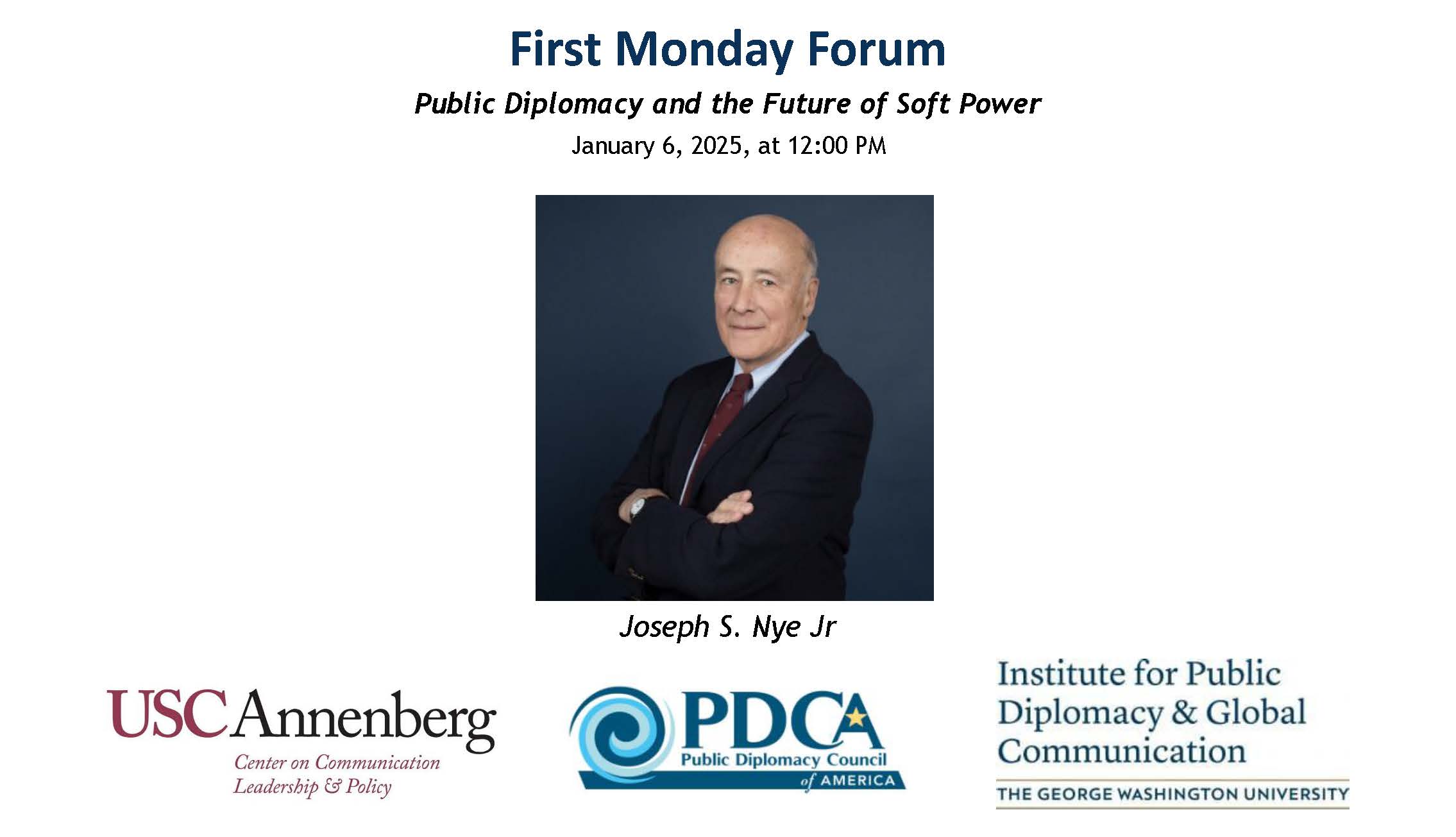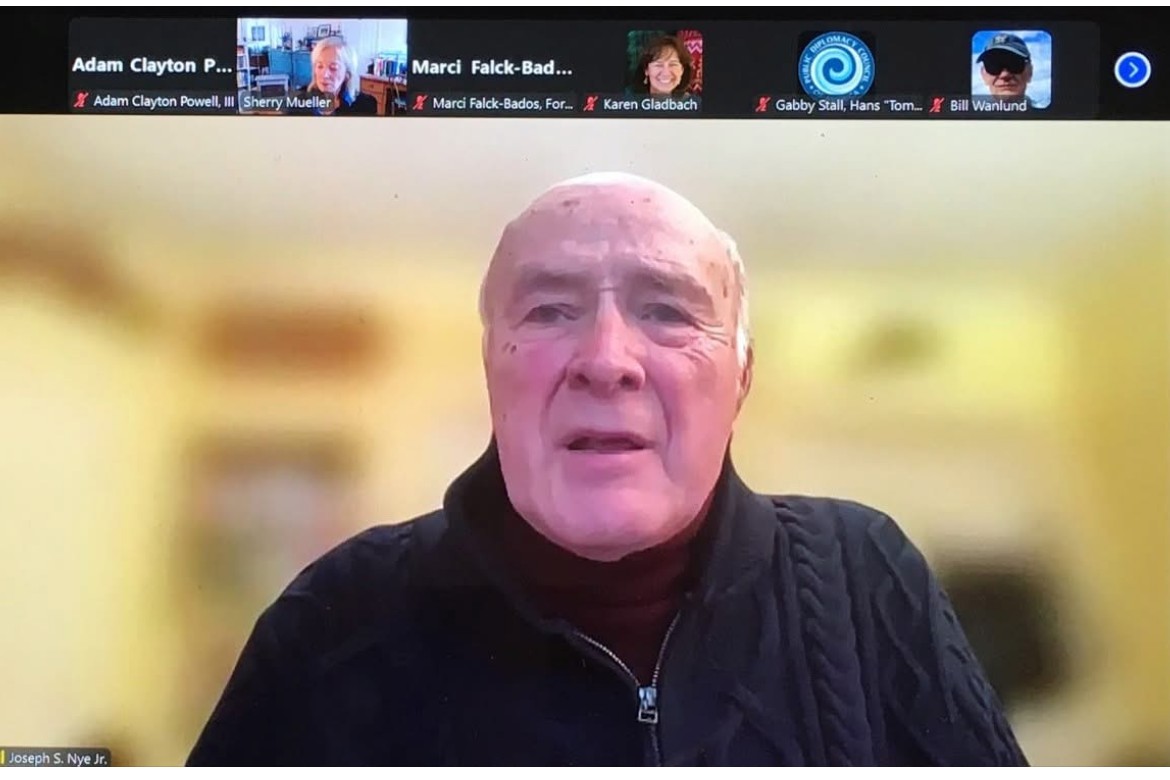Bill Wanlund's Worth Noting: Professor Joseph Nye's January 6 First Monday Forum
 Dr. Joseph Nye has ticked all the boxes for an exceptionally well-founded career in international relations – Assistant Secretary of Defense for international security affairs; chair of the National Intelligence Council; Deputy Under Secretary of State for security assistance, science and technology; Chair of the National Security Council Group on nonproliferation of nuclear weapons. In academia he was Dean of Harvard’s John F. Kennedy School of Government from 1995 to 2004. Nye, who turns 88 on Jan. 19, is currently Harvard University Distinguished Service Professor, Emeritus.
Dr. Joseph Nye has ticked all the boxes for an exceptionally well-founded career in international relations – Assistant Secretary of Defense for international security affairs; chair of the National Intelligence Council; Deputy Under Secretary of State for security assistance, science and technology; Chair of the National Security Council Group on nonproliferation of nuclear weapons. In academia he was Dean of Harvard’s John F. Kennedy School of Government from 1995 to 2004. Nye, who turns 88 on Jan. 19, is currently Harvard University Distinguished Service Professor, Emeritus.So the foreign policy establishment paid attention when he coined the name and developed the concept of Soft Power, which Nye has defined as “the ability to affect others by attraction and persuasion rather than just coercion and payment.” Soft power, and its governmental component, public diplomacy, soon became a recognized feature of international relations--and Nye quickly became a legend in the field.
The legend himself was the guest January 6 at the opening event in the Public Diplomacy Council of America’s 2025 series of monthly First Monday Forum (FMF) programs. At the urging of PDCA past co-president Sherry Mueller, Nye revealed some of the origin story of the soft power concept.
It began, he said, in the late 1980s, when there was “a widespread belief that the United States was in decline. [British historian] Paul Kennedy's 1987 book The Rise and Fall of the Great Powers was a New York Times bestseller. I didn't think that was quite right. After I totaled up American military and economic power, there was still something missing--our ability to get what we want through attraction rather than coercion or payment. So that gave rise to the term and I still think it makes sense.”
 Nye admitted briefly rethinking the nomenclature when he realized that some people would think that soft power would somehow replace the “hard” powers of economic and military strength. “And that wasn't my intent. If you consider only hard power of military and economic power, or only soft power, you're missing something. That's why I developed the term ‘smart power’ meaning the ability to combine hard and soft power so they don't cancel each other out but reinforce each other. But soft power as originally defined I think is still the same idea.”
Nye admitted briefly rethinking the nomenclature when he realized that some people would think that soft power would somehow replace the “hard” powers of economic and military strength. “And that wasn't my intent. If you consider only hard power of military and economic power, or only soft power, you're missing something. That's why I developed the term ‘smart power’ meaning the ability to combine hard and soft power so they don't cancel each other out but reinforce each other. But soft power as originally defined I think is still the same idea.”“I think the pillars of soft power are a country's own domestic values, and how well it practices them,” Nye went on. “In foreign policy, it’s whether one helps others as opposed to being extraordinarily self-centered. And that's where public diplomacy comes in. If you can express your values in a foreign policy which is attractive to others, then you don't have to spend as much on carrots and sticks.”
So where do public diplomacy and soft power intersect? Nye says, “Public diplomacy is important as a way for a government to get its message out to publics in other countries, not just to other governments. But it's also worth remembering that public diplomacy is not the only source of soft power. A great deal of a country’s attraction comes from civil society. To understand American soft power, you have to look at the role of everything from Harvard to Hollywood or the Bill and Melinda Gates Foundation or the various aspects of our culture which can attract others. Smart public diplomacy plays up those virtues but doesn't try to control them.”
“The danger is, if government'’s public diplomacy becomes seen as manipulative or pure propaganda, it no longer attracts. I think it's important to realize that a lot of our attraction, our soft power, comes from our civil system. It’s important that the government support that but not get in its way.”
Nye’s January 6 appearance at the Forum coincided with the anniversary of the 2021 storming of the Capitol by supporters of defeated presidential candidate Donald Trump, bent on preventing Congress’s constitutionally-required certification of Trump’s opponent, Joe Biden, as winner of the 2020 election. Trump’s impending inauguration prompted interest in the role of PD in the new administration’s foreign policy; so did the irony that, at that very moment, members of the House and Senate were again assembling in the Capitol, this time to certify Trump’s victory over Biden’s Vice President, Kamala Harris, four years later. Nye was asked if he had advice for the new Trump administration on using soft power.
Nye replied, “Practice what you preach. [When] we practice our democratic values, we attract others; when we talk about our democratic values but don't practice them, we undercut our soft power. January 6th, 2021, was [Trump’s] threat to our soft power, because it looked like we weren't practicing the peaceful transition of power we promise in our democracy. Today, Kamala Harris’s presiding over the transition related to an election she lost is attractive to others without our having to make a big fuss about it.”
Nye also said, “I worry a little bit about a phrase like ‘America First.’ Not because it puts America first. Every politician in a democracy has to think of their national interest first. But be careful how you express ‘America First’ abroad, and also think of areas where you can see and share common interests, and express those too.” Finally, “don’t overly narrow the picture of America. A great deal of attraction rests in aspects of our society that the government cannot and should not try to control in a democracy.”
Nye acknowledged that “the new administration is less interested in soft power than it ought to be, and that makes the job of FSOs more difficult. But remember that, even if government policies are not popular, American values can still have important impact, which means the job that FSOs are doing remains important.”
[At the Capitol, shortly after Nye’s FMF program concluded, Vice President Harris began the state-by-state roll call tally of electoral votes. The procedure took less than 40 minutes, with no interruptions or delays. “Today, America’s democracy stood,” Harris said after announcing the result.]“I’ve always been impressed by the by the quality and dedication of FSOs, and I would say keep your spirits up, because we need you!”
[The link to the January 6 First Monday Forum featuring Dr. Nye is here. The program was cosponsored by the Public Diplomacy Council of America, George Washington University’s Institute for Public Diplomacy and Global Communication, and the University of Southern California’ Center on Public Diplomacy.]
# # #
Bill Wanlund is a PDCA Board Member, retired Foreign Service Officer, and freelance writer in the Washington, DC, area. His column, Worth Noting, appears occasionally in the PDCA Update and the PDCA Blog; it seeks to address topics of interest to PDCA members.